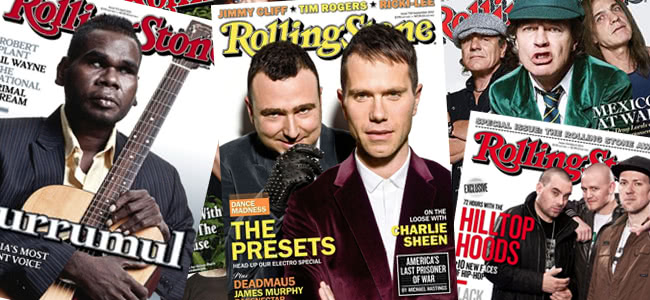Print media has undergone some drastic shifts in recent years as it feels the squeeze of large parts of its audience shifting to the digital realm to get their music and news fix.
Something that’s already been made clear here in Australia, with the discontinuation of a number of street press outlets and print publications last year, while even major international music publications saw declines in circulation, which may have something do with NME trialling a paywall for some of its online content.
Now a major change to one of music’s longest-running and most iconic magazines has triggered a major change to its Australian edition.
Rolling Stone’ Australian Editor in Chief Matthew Coyte has now become the publisher of the local edition of the magazine, forming a new company in the process to handle the future of the print icon as it acquires Rolling Stone Australia for an undisclosed figure, as The Music reports.
The Bauer Media Group were the publisher of the Australian edition of the magazine, but amid rumours about the publication’s future, Rolling Stone‘s New York based founder and editor Jann S. Wenner has confirmed that the Down Under edition will continue “uninterrupted” as publication control goes to Austrlian Editor In Chief Matthew Coyte and his new company Paper Riot Pty Ltd.
The “entire staff is coming along for the ride,” the newly installed Editor/Publisher tells The Music, including Rolling Stone‘s National Advertising, Sponsorship, and Event Manager Amy Gates, who will maintain the role she’s held at Bauer Media for two years. “I’m thrilled to be taking the Rolling Stone brand into its next chapter… [and the] entire staff is coming along for the ride.”
According to the publisher’s ‘fast facts‘, under Bauuer Media, Rolling Stone‘s Australian edition has a readership of 293,000 a month from a circulation of 18,086, while over in the US, the magazine reached a circulation of 1,473,497 closing June 2013 according to figures from the Alliance For Audited Media.
The 1.47 million figure means the magazine has been selling more steadily than most in the last six years, which is slightly above its 1.45 million sales of 2007 and a slight dip of 1.48 million from 2011, as CNN points out, with 95% of that circulation figure coming from subscriptions, while the remaining 5% comes from individual sales from newsagents and vendors.
Bauer Media have given the Paper Riot deal their blessing, with the new business no longer working in the publisher’s offices as it now continues the legacy of the Australian Rolling Stone, which is the longest surviving overseas edition of the music magazine – with British, Japanese, and European editions having all since folded.
“We’ve developed a great working relationship with Matt through the years,” said Mr Wenner of the deal. “We look forward to continuing the extraordinary journalistic traditions of Rolling Stone and connecting with out Australian readership under his care.”
Coyte had worked top positions at FHM and Empire before beginning his tenure at Rolling Stone in 2008, when publishers ACP Magazines acquired it. Coyte remained Editor In Chief when ACP was in turn bought up by Bauer Media Group last year.
“I’m thrilled to be taking the Rolling Stone brand into its next chapter,” says Coyte. “The magazine has a rich history and commitment to fearless journalism and I look forward to reminding people of this every month,” he adds.
“It’s not only the in-depth artists interviews that make Rolling Stone a prodigious brand. From coverage of moments like the death of John Lennon to the downfall of General McChrystal to Matt Taibbi’s commentary on the global financial crisis, Rolling Stone informs readers of what matters now.”
One such cover feature stirred up a firestorm of controversy back in July, when the August edition of the music magazine featured Boston Bomber Jahar Tsarnaev on its cover, accused of glamourising the terrorism suspect as the controversial cover choice drew a hail of criticism and balckash in print and online.
Despite the wide panning the cover received, including a scathing letter from Boston’s Mayor and some retailers boycotting the issue in protest, the move didn’t hurt sales but instead boosted them. With Ad Week reporting that the Boston Bomber issue was a hit at newsstands, while over in the UK sales in fact doubled, according to The Daily Mail.



































